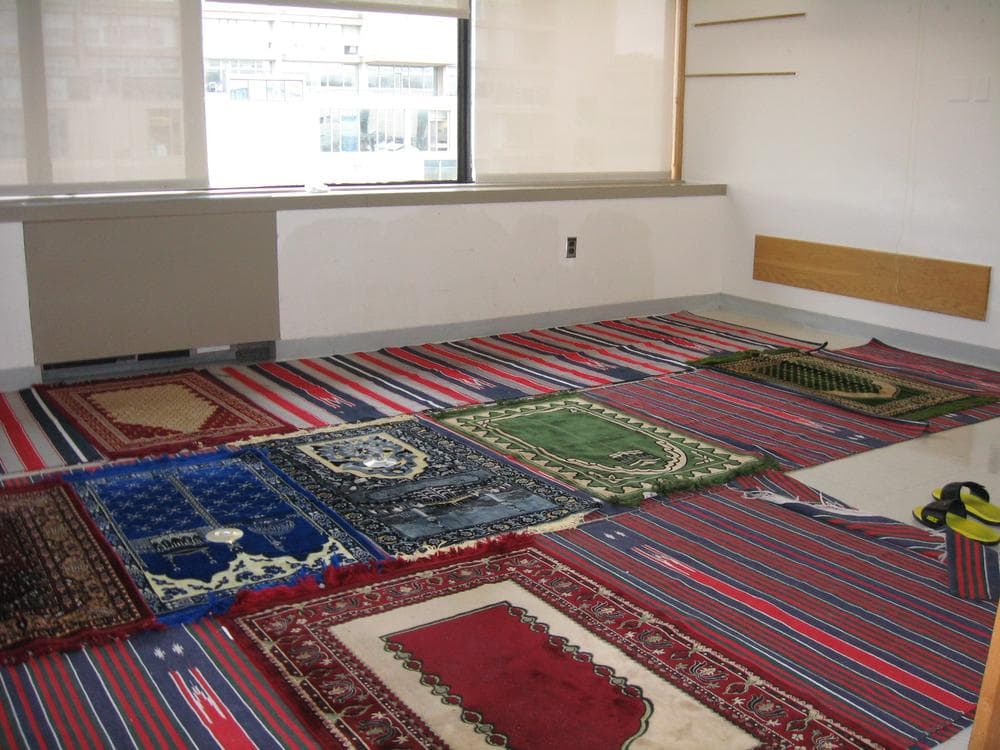Advertisement
For Injured Libyans In Mass., A Taste Of American Life
ResumeThe aftermath of the revolution in Libya is touching Massachusetts in a very personal way: about two dozen Libyan fighters injured while helping overthrow Moammar Gadhafi's regime are receiving medical care at Spaulding Hospital in Salem, the only hospital in the country treating wounded Libyan rebels.
They arrived in late October, and most of them are still here. So this week, WBUR's All Things Considered host Sacha Pfeiffer went to Spaulding — and found that these Libyan patients' days are filled with much more than just medical care.
SALEM, Mass. — Our visit started in a therapy room where hand-written signs in Arabic are taped to the walls and four Libyan patients were doing physical therapy for a variety of injuries to their shoulders and hands and arms.
I couldn't stop staring at the fingers of one of them. They were bent and scarred and discolored, and some of the nails were just stubs. That patient was Marwan Mafud. He's 22, a former mechanic, and he drove supplies to the rebels. I asked him through a hospital translator what happened, and he said Gadhafi's militia smashed his fingers with the butt of a Kalashnikov rifle.
"After that, I got hit on my head and my legs," he said. "It was very painful and severe. It was a open-wound and you can see the bones of my fingers."
Five months later, he still can't bend some of them. Now, Libya's National Transitional Council is paying for many of these fighters' medical care. But these men may want more than just that.
Another patient, 35-year-old Ramzi Ben-Rahhal, has a splint on his right forearm and a long, red gash of a scar criss-crossing his upper arm and elbow. He needs only one word to describe how his injury happened: "gunshot."
By a sniper using special bullets with chemicals inside them, he said. Ben-Rahhal had surgery in Tunisia, but he now has nerve damage and an arm full of metal pins.
"I was expecting to be killed because actually two of my colleagues, they got killed in the scene," he said through his interpreter's imperfect English.
"You saw colleagues die?" I asked.
"Yes," he replied.
That makes it almost surreal that Ben-Rahhal is now at a U.S. hospital that's offering English classes, Arabic television and a Muslim prayer room. Small sticky notes with English words on them are scattered throughout Spaulding to help the Libyans learn the names of common objects. "Window." "Counter." "Table."

Ben-Rahhal has improved enough that he's now staying at a local hotel and receiving treatment as an outpatient. That's giving him lots of free time to explore the area.
"From what you've been able to see of the United States, what have your impressions been?" I asked him.
"Especially in Boston, there is one thing I really like. But I can't tell you," he replied.
Puzzled, and noticing his mischievous smile, I asked for a hint.
"He really likes the American restaurant, recipes, and the staff working at the American restaurant," his interpreter said.
The more we talked, I realized that he seems to have a crush on a certain waitress, although he won't say who or where. He said there's more he likes about the U.S., too.
"One of the good thing about the American nation is the diversity and the all-all one nation," Ben-Rahhal added. "You can't feel the difference and segregation between people based on sex or color or tongue or anything."
He also said our political system is a very good thing. He described it as "advanced" compared to his own government.
"In our culture," he added, "we say one thing about the American nation: 'You live your heaven in the earth in the state.' "
And he marvels that when he takes cabs, the driver doesn't seem to try to overcharge him. He says, back home, that's not something to take for granted.
"What do you do when you're not at the hospital?" I asked?
"I go outside by myself," he said. "I go to the mall."
The North Shore Mall has become a frequent destination. Ben-Rahhal pulled a folded note out of his wallet that he says he gives to taxi drivers. At the top of it was something written in Arabic. Then, beneath, it read: "North Shore Mall. I would like to go to the mall."
"Are you doing a lot of shopping?" I inquired.
"A lot!" he replied.
Ben-Rahhal says he used to be a landscape architect and he would like to go home briefly to see his mother, who's had a stroke since he's been gone. But he said he then wants to to return for good to the U.S.
"I was a civilian — innocent," he said, "and unfortunately I turned to be a fighter. I killed people and I saw a lot of killed people around me. And now when I came here to the hospital I'm start to heal."
"Do you feel like you're here not just to heal your arm and your leg, but your mind?" I asked.
"This is the most thing that I really need," he answered. "I never expect myself to improve psychologically."
Spaulding Hospital says several of the Libyan patients have been diagnosed with post-traumatic stress disorder and received counseling and medication. For patients like Ben-Rahhal, even adjusting to the freedom of life here has been jarring.

"I was in the beginning — I was panic to be stopped by any authority — police or anyone to ask for my checkpoint," he said through his interpreter's choppy translation.
He laughs when he tells me that the only time he's been asked to show his identification since he's been in the U.S. was when he bought a pack of cigarettes.
"Since I am here, no one ask me for any checkpoint or check my ID," he continued. "In the opposite way, they are very helpful. They ask me, 'If you need us, you need help, please call 911.' "
Dr. Ryan Zaklin, who's part of Ben-Rahhal's medical team, says the Libyan patients are just regular guys with regular jobs whose lives were suddenly turned upside down.
"They're just like us," he said. "I mean, they have smartphones and they have laptops. They're on Facebook. They're very intelligent and very well-educated. It's forced me to ask the question myself: if we had a dictator here, would I be picking up a machine gun with my neighbors and going and fighting for what I felt was right? And I don't know the answer to that. Hopefully I'll never need to know the answer to that. But certainly I admire their courage and their bravery for standing up for what they believe in."
Of the 22 Libyans who came to Spaulding in late October, 17 are still there. Most of them are expected to be discharged by shortly after the New Year, even though many of them say they wish this could be their new home.
This program aired on December 9, 2011.